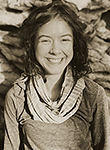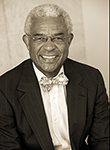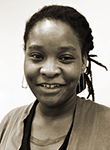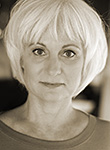When she died in December 2014, Claudia Emerson left behind three completed volumes of new poems. The Opposite House and Impossible Bottle appeared in 2015. The third book, Claude Before Time and Space, is forthcoming in 2018.
In the six poems from that collection published here, Emerson puts her father on the record for us in a handful of late lyrics. “Same as you” Claude points out in “Rabbit,” comparing his daughter to her eponymous totem, it’s a “creature of habit / travelling the same narrow path worn / slick, through broomsedge and scrub pines.”
Emerson depicts familiar landscapes of human thought and feeling, their crosshatching of drives (hunger, thirst, fear) propelling us toward survival. These quiet vignettes offer blessed assurance that her marks on the world are still ours to follow as we walk on, beside “the water the deer / already have made slick paths to.”
Other content in a Reading Loop celebrating Emerson includes two memorial readings that took place in Richmond, one by Emerson’s community of faculty, students, and friends at VCU and the other by poets strongly connected to her work.
A video of her reading in the summer of 2013 at the Sewanee Writers’ Conference appears with their gracious permission, and her former student Allison Seay attempts to elegize the elegist in her essay, “The Disappearing Threshold.” Lauren Miner, another former student, presents a photographic record of Emerson’s VCU office to complete the section.
Each spring Blackbird’s Introductions Reading Loop recognizes new artists of note whose work strikes us as unusually fine and full of promise. Joining this company for 2016 are poets Jacqueline Balderrama, Dorothy Chan, Eman Hassan, and Emily Skaja; fiction writers Max Berwald and Anna Caritj; and memoirist Larry Palmer.
A certain dislocation haunts much of this work, perhaps most literally in Hassan’s poems evoking Kuwait after the 1990 Iraqi invasion. As Balderrama notes, “God could be dark matter, named yet inexplicable.”
Berwald strands his characters in the nightlife of an oddly generic Beijing. Pink flamingos of unknown origin materialize on Caritj’s West Virginia lawn. A long-lost brother appears for a family funeral in Palmer’s memoir, and Skaja’s narrator tries to navigate her grandmother’s increasingly loose relationship with time. Chan decamps completely from causal reality to investigate the elusive challenge of abstraction in her ekphrastic salute to Kandinsky’s compositions.
The First Novelist Reading Loop presents Boris Fishman, winner of the 2015 Cabell First Novelist Award for A Replacement Life, the story of a young writer, Slava Gelman, who puts his skills to use by helping forge Holocaust reparation claims for his Jewish neighbors.
Fishman reads an excerpt from the novel before joining a panel discussion about the process of writing and publishing. A review of the novel appears in Nonfiction.
Fishman is also represented by the essay “Oksana’s Kitchen: An Unlikely Friendship across Three Generations, Two Continents, and One Dinner Table (A Memoir, with Seasoning),” which recovers family history and other connections through the agency of food and recipes.
Much of the work in this issue enacts a perceptible turning-inward, and, while the sorts of introspection that signpost more purely lyrical concerns are clearly audible, so too are the strains of a more collective music, ballad-like, celebrating the complex web of expectations and disappointments that transform a house into a home.
Approaching death (or the event horizon of one of his signature trans-personal time warps) Norman Dubie’s remorseful engineer-cum-encyclopedia salesman recalls repurposing his son’s red wagon to schlep “the first half / of the alphabet” from door to door, braving hairless dogs and “macaroni fog” and one “nearly naked widow” who longed to study Sartre.
Sampling sources that range from Roland Barthes to the King James Bible, B.K. Fischer’s manic, activist speaker “busies herself making a machine for / resistance.” Then the automatic negatives kick in: “If she can touch it, / it’s kitsch; if she can hear it, it’s dreck.” Makers beware.
T.R. Hummer mourns the passage of old blues and jazz performers, heart hurt as he imagines their last days played out in chintzy hotels, “singing / each other farewell through dumbwaiters / And moldy air shafts.” But he also telegraphs the angst of a father bidding a more temporary farewell to a teenage daughter headed abroad in a dangerous world, which he pictures her traversing “surrounded by concertina wire and fiery customs officials.”
Not unlike the spectral custodian watching over the young girl in Debarati Mitra’s “No, No, and No” who advises sagely, “it’s inside you that the opaque curtain trembles” but recognizes troubling signs looming above the “fairy-shaped candle / with her little lighted tongue” who “licks up the dark.”
Maya Marshall’s speaker, relieved to some extent by her mother’s death, is free at last to “dream what not to be,” and the catalog of all she refuses is a bitter dirge for the dead woman’s “blue notes,” her smoking in bed, her “anxiety meds, / baskets of paper, piles / of clothes . . .”Some luminous artifacts churn to the surface of the deep waters roiled by the ongoing deconstructions and reconstructions of domestic spaces. Fritz Ward offers an ode to the archetypal anticipation of licking gooey batter from a beater in his mom’s kitchen, watching “the slivers of her / face reflected” in its “picket / of blades.”
A similar mood carries over from the German in poems by Nicolas Born. Translated by Eric Torgerson, “Juices” recast’s the oft-envied fly on the wall as a kitchen table that witnesses its share of “( . . . all / the nice touches) / ah black coffee / juices (juices) / ham,” as well as some “casual / fucking / a little here a little there.” O appetite. O blessed dishcloth.
Presenting herself in “Chore Wheel” as the “grave // valet” who tips the “garbage bin . . . on two wheels” and drives it down the walkway, blue silk pajamas “stuffed into [her] boots,” Lisa Wells reminds us that many dwell indoors sporadically—house reduced here to housing. How easily and quickly any among us may be “dispossessed . . . / in the street, an icy wind” batting at her drawstrings.
Jesse Lee Kercheval’s efficient translations of Uruguayan poet Javier Etchevarren take a more optimistic view. The youthful avatars of the poet see through to the fact that home is less about a place than the people “in the corner grocery / of the Galicians Pilar and Luis” or amid the “encyclopedias and fantasies” of the enormous library his mother cleans, its “wide and true” world.
In another vein, Ms. Hicks, the protagonist in a collaborative suite of poems by David Huddle and Meighan Sharp, first materialized to them in an earlier work as she threw a rotten cantaloupe at some teenagers. While she is newly dead in these offerings, she continues to voice observations and share opinions.
The names of the two lakes in Lee Smith’s story—one eponymous to the title, “Hungry Mother,” the other called Clearwater—point us toward the Janus-faced nature of ecstatic revelation (beauty and terror), leaving us to agree when her narrator tells us, “My dad had said that there were places in this lake where no one had ever touched the bottom, and looking out now at that still, black water, I believed it.”
Caught in the dark waters of historical circumstance, the two boys of Matthew Baker’s “The Resurrectionists” try to find a way to assuage their mother’s deep sadness while Dublin’s Easter 1916 uprising unfolds around them. By the time the uprising ends, “Their mother was alive again, and still the boys felt like old men lost in a foreign country. Wherever they were, they didn’t want to stay.”
Similarly, the characters of Seth Clabough’s terse but lyrical “Und So Weiter” inhabit a landscape where revelation has provided no solace and where grief at the death of a son has overwhelmed all reason.
On the other hand, Richard Jespers in “Delia’s Reunions” and Julia Lichtblau in “Petrouchka” recognize that soldiering on through the different roles made necessary in a maturing life can be like dancing to “a well-worn tune whose smart lyrics might never lose their appeal.”
In Brian Schwartz’s essay, “Inside the Envelope,” music also provides common ground when two unlikely brothers, one a rabbi, one a writer, travel together to a Grateful Dead concert. “What would we be without experiences like this?” Schwartz tells us. “Individuals soberly explaining themselves to other individuals, convinced that connection can only happen when people are like-minded and superficially simpatico.”
If much of the work presented here has been telling us to, in the words of E.M. Forster, “only connect,” then David Wojahn in “‘On Hearing That My Poems Were Being Studied in a Distant Place’: Thoughts on Distance, Difficulty, and Secret Addressees” states clearly the imperative that poems and other written art can have “an awareness of their status as well-travelled messages in bottles—and as such offer the reader a sense of haunted intimacy.”
Reviews by Craig Beaven, Ross Losapio, and Laura Van Prooyen of new work by Sandra Beasley, Phillip B. Williams, and Susan Aizenberg round out Nonfiction.
In Gallery, Irene Ziegler’s play The Little Lion confronts its audience with life in in the Jewish ghetto in Kovno, Lithuania, during World War II.
In Features, audio presentations of readings and events with Jimmy Santiago Baca, Nick Flynn, and Jean Thompson complete the issue. ![]()
Return to top menus | Browse issue














